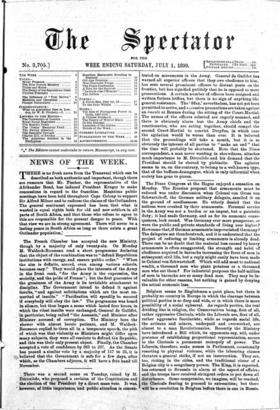There was a second scene on Tuesday, raised by M.
Deroulede, who proposed a revision of the Constitution and the election of the President by a direct mass vote. It was, however, of little importance, and public attention is concen- trated on movements in the Army. General de Gallifet has warned all superior officers that they owe obedience to him, has sent several prominent officers to distant posts on the frontier, but has signified publicly that he is opposed to more prosecutions. A Certain number of officers have resigned and written furious letters, but there is no sign of anything liks general resistance. The' Sfax,' nevertheless, has not yet been permitted to arrive, and e-cessive precautions are taken against an gmeute at Rennes during the sitting of the Court-Martial. The names of the officers selected are eagerly scanned, and there is obviously alarm lest the Army chiefs and the reactionaries, who are acting together, should compel the second Court-Martial to convict Dreyfus, in which case the agitation would be worse than ever. It is believed that the proceedings will take a month, but it is so obviously the interest of all parties to "make an end" that the time will probably be shortened. Note that the Times correspondent, a man never wanting in shrewdness, attaches much importance to M. Deroulede and his demand that the President should be elected by plebiscite. The agitator seems to us, on the contrary, to belong to a well-known type, that of the buffoon-demagogue, which is only influential when society has gone to pieces.















































 Previous page
Previous page